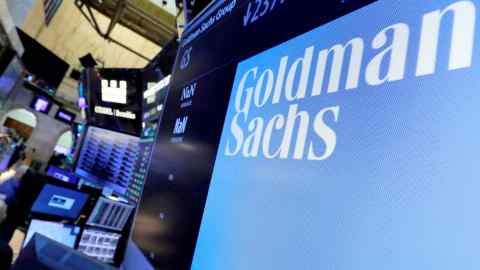
Goldman Sachs warned on Monday that it would slow hiring and may cull underperforming staff even as the Wall Street giant’s traders helped it overcome a slump in dealmaking and report better than expected profits in the second quarter.
With fears of a recession mounting, Goldman chief executive David Solomon warned of increasing uncertainty owing to high inflation, monetary policy tightening in the US and the war in Ukraine.
“In my dialogue with CEOs operating big global businesses, they tell me that they continue to see persistent inflation in their supply chain,” Solomon said in a call with analysts.
Finance chief Denis Coleman said the bank was “closely re-examining all our forward spending and investment plans”. This includes slowing the pace of hiring and potentially reintroducing the year-end performance review of its employee base, which it had largely halted during the coronavirus pandemic.
The Financial Times reported last week that Goldman had paused hiring some replacements for bankers who left this year.
The downbeat outlook contrasted with the market’s reaction to Goldman beating earnings, with the bank’s share price up about 2.5 per cent on Monday.
One analyst remarked to Solomon and Coleman that “your guys’ tone sounds very, very cautious” despite “pretty strong results”.
For the second quarter, Goldman reported net income fell 47 per cent to $2.9bn or $7.73 per share, from $5.5bn or $15.02 per share in the same period last year. This was ahead of analysts’ estimates for $2.6bn or $6.65 per share, according to consensus data compiled by Bloomberg.
Revenue from investment banking was down 41 per cent at $2.1bn, in line with analysts’ estimates and a smaller decline than the 61 per cent reported last week by rival JPMorgan Chase and the 55 per cent fall at Morgan Stanley.
Investment banks are suffering in particular from a dearth of equity underwriting activity, following a slew of initial public offerings and listings by special purpose acquisition companies last year.
Partially offsetting the investment banking declines were revenues in Goldman’s trading division, which has benefited from heightened buying and selling during the recent market volatility.
Revenues were up 32 per cent at $6.5bn, remaining above pre-pandemic levels and ahead of analysts’ forecast for $5.8bn. Revenues from trading at JPMorgan were up 15 per cent and up 21 per cent at Morgan Stanley.
Fixed-income trading revenues were up 55 per cent at $3.6bn, ahead of estimates for $3.1bn, while revenues from equities were 11 per cent higher at $2.9bn, also slightly ahead of analysts’ expectations for $2.7bn.
Goldman said its board of directors had approved a 25 per cent increase in its quarterly dividend to $2.50 per share.
In the quarter, Goldman also provisioned $667mn for credit losses amid rising concerns that a potential recession in the US will affect credit quality.
The bank’s asset management division reported revenues of $1.1bn, down 79 per cent from the same period last year, when Goldman benefited from significant gains on its equity investments. Analysts had forecast revenues of $685mn.
Revenue in the consumer and wealth management unit, which includes its online bank Marcus and its Apple credit card, was up 25 per cent at $2.2bn, just ahead of analysts’ forecasts for $2.1bn.


